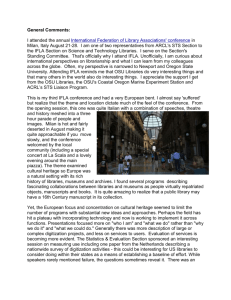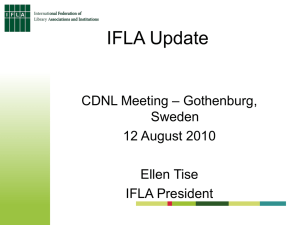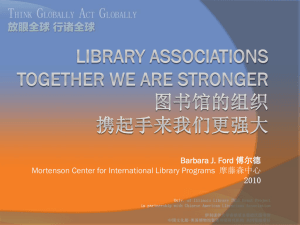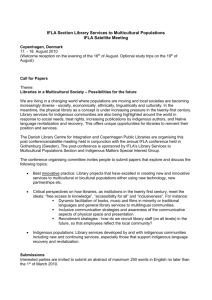IFLA Section of Science and Technology Libraries Newsletter
advertisement
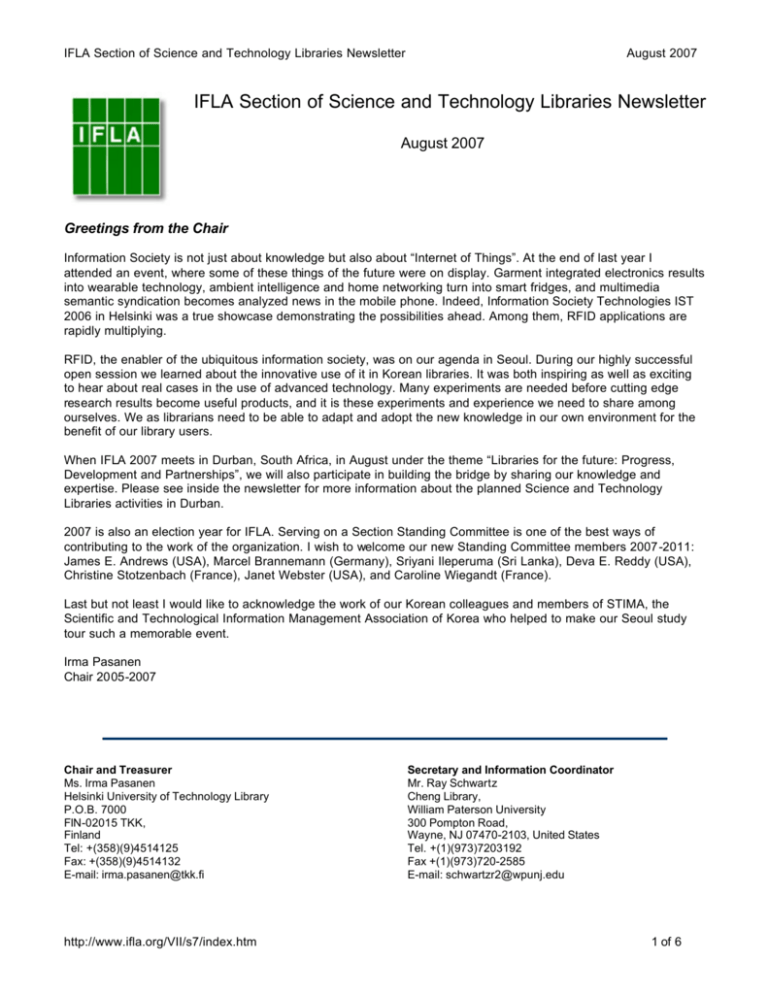
IFLA Section of Science and Technology Libraries Newsletter August 2007 IFLA Section of Science and Technology Libraries Newsletter August 2007 Greetings from the Chair Information Society is not just about knowledge but also about “Internet of Things”. At the end of last year I attended an event, where some of these things of the future were on display. Garment integrated electronics results into wearable technology, ambient intelligence and home networking turn into smart fridges, and multimedia semantic syndication becomes analyzed news in the mobile phone. Indeed, Information Society Technologies IST 2006 in Helsinki was a true showcase demonstrating the possibilities ahead. Among them, RFID applications are rapidly multiplying. RFID, the enabler of the ubiquitous information society, was on our agenda in Seoul. During our highly successful open session we learned about the innovative use of it in Korean libraries. It was both inspiring as well as exciting to hear about real cases in the use of advanced technology. Many experiments are needed before cutting edge research results become useful products, and it is these experiments and experience we need to share among ourselves. We as librarians need to be able to adapt and adopt the new knowledge in our own environment for the benefit of our library users. When IFLA 2007 meets in Durban, South Africa, in August under the theme “Libraries for the future: Progress, Development and Partnerships”, we will also participate in building the bridge by sharing our knowledge and expertise. Please see inside the newsletter for more information about the planned Science and Technology Libraries activities in Durban. 2007 is also an election year for IFLA. Serving on a Section Standing Committee is one of the best ways of contributing to the work of the organization. I wish to welcome our new Standing Committee members 2007-2011: James E. Andrews (USA), Marcel Brannemann (Germany), Sriyani Ileperuma (Sri Lanka), Deva E. Reddy (USA), Christine Stotzenbach (France), Janet Webster (USA), and Caroline Wiegandt (France). Last but not least I would like to acknowledge the work of our Korean colleagues and members of STIMA, the Scientific and Technological Information Management Association of Korea who helped to make our Seoul study tour such a memorable event. Irma Pasanen Chair 2005-2007 Chair and Treasurer Ms. Irma Pasanen Helsinki University of Technology Library P.O.B. 7000 FIN-02015 TKK, Finland Tel: +(358)(9)4514125 Fax: +(358)(9)4514132 E-mail: irma.pasanen@tkk.fi http://www.ifla.org/VII/s7/index.htm Secretary and Information Coordinator Mr. Ray Schwartz Cheng Library, William Paterson University 300 Pompton Road, Wayne, NJ 07470-2103, United States Tel. +(1)(973)7203192 Fax +(1)(973)720-2585 E-mail: schwartzr2@wpunj.edu 1 of 6 IFLA Section of Science and Technology Libraries Newsletter Librarians Without Borders: a Medical Library Association Global Initiative by Jill Mayer, Health Sciences Library, UNC Chapel Hill, North Carolina, USA In 2006, as a result of the recommendations from the Medical Library Association’s (MLA) Global Initiatives Task Force and in response to recent natural and manmade disasters, the MLA launched the Librarians Without Borders Task Force. This two-year task force is charged with: • Developing criteria for a new MLA award for excellence in international service through which individual(s) or an organization could be honored for contributions to improvement in international health information provision. • Suggesting sustainable collaborations with groups advocating worldwide health improvement and health literacy. • Suggesting a mechanism to provide information assistance for persons responding to epidemics and natural and man-made disasters anywhere in the world and/or proposing a mechanism for training in the field of information retrieval and information assistance to people anywhere in the world. • Preparing content for a new MLA website: “Librarians Without Borders”. August 2007 success of the fulfillment of the charge. MLA Librarians Without Borders Task Force members: Marcus Banks, Chair MJ Tooey, MLA Past President Carla Funk, MLA Exec Officer, ex officio Grace Ajuwon Lenny Rhine Carole Gall Tony McSean Jill Mayer The IFLA Section of Science and Technology Libraries Study Tour 2006, Tuesday, August 22, 2007 By Billie Reinhart and Jill Mayer The Science and Technology Science Study was a great success. The tour began early on Tuesday August 22 when over 30 participants boarded the bus at 8:15 am at the COEX (Conference Center) for an excursion that would take us 160 km from Seoul. This gave some of us our first glimpse of the rice fields, the vineyards and other agricultural venues of South Korea. Progress in achieving these goals has been made. The task force has recommended a new award, the “T. Mark Hodges International Service Award” and developed criteria. This new MLA award was approved by the MLA and will be presented for the first time during the Philadelphia meeting of the MLA, May 18-23, 2007. An MLA “Librarians Without Borders” logo has been developed and is included on the MLANET website: Global Partnerships and Initiatives <http://www.mlanet.org/resources/global/>. The task force submitted a presentation proposal to the 2007 IFLA Health and Biosciences Section Satellite session, “Library Frontiers: Disasters, Emergency Preparedness and Emerging Diseases”. If selected, the presentation will outline recent accomplishments as well as preview the recommendations that the task force will make to the MLA Board in 2008. It will include the criteria for selecting a core list of institutions and associations for MLA to make initial contact. Part of the recommendation is to advise on follow-through steps for MLA to institutionalize and maintain the viability of the partnerships and web site links. Another important part is to recommend how to measure the http://www.ifla.org/VII/s7/index.htm Our first stop was a visit to the Mt. Gyeryong Gapsa temple (www.gapsa.org / tour.gongju.go.kr/eng/ area/area_temple_1.php), established in 420 C.E. However, due to military and religious unrest the buildings were burned so the oldest remaining structure dates to the 1600s. After visiting the Main Buddha shrines and other buildings we shared in Balwoogongyang, a wooden bowl meal offering, and followed the strict regimen of the Buddhist monks. Our last stop at the Temple site was to see samples 2 of 6 IFLA Section of Science and Technology Libraries Newsletter of prints made by early movable wood type that were a few hundred years old. We traveled from the Gapsa Temple to the Daedeok Innopolis (www.ddinnopolis.or.kr) in Daejeon—also referred to as Daedeok Science Town or Daedeok Valley (www.metro.daejeon.kr/english/investdaejeon/ daedeokvalley/whatisddv.jsp). The Daedoek Innopolis brings together over 600 IT-specialized firms, six academic institutes (Chungnam National University, Daeduk College, Hannam University, Information and Communication University, Korea Advanced Institute of Science and Technology, and the University of Science & Technology), and 63 R&D institutes. The Daekdeok Innopolis has over 16,000 researchers (accounting for 10% of the country’s research personnel), has over 30,000 patents registered, and accounts for over 30% of domestic science dissertations. Our first stop was the Science Library of the Korea Advanced Institute of Science and Technology (KAIST) (library.kaist.ac. kr), a leading science and engineering university in Asia. Prof. Hyun Soo Yoon, Dean of Academic Information, arranged for us to see a presentation about the Library and visit the first floor. It was interesting to see the first floor of the Library included a small bookstore and an internet café, including food and drinks. The Institute has three colleges (colleges of Natural Science, Engineering, and Interdisciplinary Studies) and two schools (Graduate School of Management, and, the School of http://www.ifla.org/VII/s7/index.htm August 2007 Humanities and Social Sciences. There are over 400 faculty and over 7,000 students and a budget of approximately 260 million US dollars. The institute offers 13 undergraduate programs, 27 graduate programs, and 23 doctoral programs. KAIST has been ranked first among science and technology universities in Asia by Asiaweek in 1999 and 2000, nd and 42 in the top 50 worldwide in technology by the Times Higher (London) in 2005. The Library system is composed of two buildings—the main library (Science Library) and a branch library (Undergraduate Library). The collection sizes are over 230,000 volumes, 10,000 subscriptions (of which 5,700 are electronic), and over 10,000 pieces of multimedia/ebooks. The library also has access to the National Digital Science Library (NDSL – ndsl.or.kr) which has access to over 49,000 scholarly journals and over 178,000 proceedings. The library has developed their own integrated library system in 1996 called KITLAS. The library is organized under two teams—the information development team and the information management team. The information management team is responsible for collection development and maintenance. Our next stop was the Korea Institute of Science and Technology Information (KISTI), the national focal point in the field of scientific and technical information in Korea. KISTI provides a scientific and technology information center, information analysis support and supercomputing infrastructure. We were greeted by KISTI’s new president, Dr. Byoung Tae Yang, who welcomed us and gave us background information about KISTI and the desire for international cooperation. Dr. Ho Nam Choi, Director of the National Digital Science Library (NDSL) demonstrated the use of their portal. NDSL supplies one-stop searching and full text of 34 million international papers from proceedings and journals, a one-click gateway for 13,000 core e-journals and online photocopy services for documents held by the 260 DDS member libraries 3 of 6 IFLA Section of Science and Technology Libraries Newsletter nationwide. The system appears to be easy to use and links quickly to the texts. Our last stop was a visit to the Supercomputer, an impressive sight, before heading back to Seoul. We were fortunate to have Dr. Choi as our host. He answered many questions during our return trip to Seoul. * The STL Open Session “Workings of the ubiquitous library - Will all library services and content be available to anyone, anywhere at anytime?” Wednesday, August 23, 2007 By Ray Schwartz Left to right: Lili Li, Kyung-Jae Bae, Kim Sue Jeong, and Deva E. Reddy substituting for Smita Chandra http://www.ifla.org/VII/s7/index.htm August 2007 The session had a very good turnout with about 275 attendees. The STL committee agreed to submit the first paper to the IFLA Journal for publication. The paper is “The ubiquitous library for the blind and physically handicapped: a case study of the LG Sangnam Library, Korea” by KYUNG-JAE BAE (LG Sangnam Library, Seoul, Korea). Below are the titles, the abstracts of the papers, and the links to the papers and the presentations. The ubiquitous library for the blind and physically handicapped: a case study of the LG Sangnam Library, Korea by KYUNG-JAE BAE (LG Sangnam Library, Seoul, Korea) Link to English Verision Link to German Version Link to Korean Version Link to Russian Version Presentation Link This paper presents the project of the LG Sangnam Library that made real the concept of a ubiquitous library. The project intends to provide a service so that the print -disabled can take advantage of the library system and information services without complicated procedures in connections and user certifications by using NFC (Near Field Communication) technology-applied mobile phones. This model is composed of three scenarios. The first scenario offers a Digital Talking Book (DAISY) over the Internet. A user with a NFC reader-equipped mobile phone simply touches a dongle that is connected to a computer and enables the computer to conduct NFC and Bluetooth communications. The second scenario uses a wireless connection to the Internet via a mobile phone and the final scenario uses voice services via a telephone to access the library services. In the library services, users can listen to Digital Talking Books in real time. As shown in the scenarios, the purpose of the project is to offer a comfortable information environment for the printdisabled including the blind and physically handicapped by using ubiquitous technology. e-Research and the ubiquitous open grid digital libraries of the future VIVEK N. PATKAR (the ICFAI Business School, Mumbai, India) and SMITA CHANDRA (Indian Institute of Geomagnetism, New Mumbai, India Link to English Version Link to German Version Link to French Version Link to Russian Version Libraries have traditionally facilitated each of the following elements of research: production of new 4 of 6 IFLA Section of Science and Technology Libraries Newsletter knowledge, its preservation and its organization to make it accessible for use over the generations. In modern times, the library is constantly required to meet the challenges of information explosion. Assimilating resources and restructuring practices to process the large data volumes both in the print and digital form held across the globe, therefore, becomes very important. A recourse by the libraries to application of successive forms of what can be called as Digital Library Technologies (DLT) has been the imperative. The Open Archives Initiative (OAI) is one recent development that is expected to assist the libraries to partner in setting up virtual learning environment and integrating research on a near universal scale. Future extension of this concept is envisaged to be that of Grid Computing. The technologies driving the ‘Grid’ would let people share computing power, databases, and other on-line tools securely across institutional and geographic boundaries without sacrificing the local autonomy. Ushering an era of the ubiquitous library helping the e-research is thus on the card. This paper reviews the emerging technological changes and charts the future role for the libraries with special reference to India. The implementation of the RFID System for improving customized service: the case of the National Library of Korea KIM SUE JEOUNG (National Library of Korea, Seoul, Korea Link to English Version Link to German Version Link to French Version Link to Korean Version Link to Russian Version Presentation Link The National Library of Korea (NLK) has introduced and operated the RFID (Radio Frequency Identification) system linked with the library card registration policy since July 2005. Most of all, we aim to set up the basis of the Ubiquitous Library and to provide a highend patron service by utilizing the RFID. The NLK has utilized the RFID in an effort to enhance library patron rights and to upgrade patron services, while in November 2004, introducing a new subject specialist services system. This paper http://www.ifla.org/VII/s7/index.htm August 2007 introduces the process of building an RFID operational system and a case study for service improvement. The NLK has built a new feature called “My Library” which is linked with a library card system and an RFID system to enhance library patron rights. The Library Card system is employed for patron online registration, and it provides better quality services through the Subject Specialist Librarian Support System. The Subject Specialist Librarian Support System is a management system that librarians use to manage the patron's special interests to improve one-to-one customization services. When a patron registers online and selects his/her special interests in the system, a subject specialist librarian will then manage the patron’s special interests. A patron management system by subject interests is a creative system and will become the basis of the U-Library in the near future. Building the ubiquitous library in the 21st century LILI LI (Georgia Southern University, Statesboro (GA), USA) Link to English Version Link to German Version Link to French Version Link to Russian Version Presentation Link On the basis of web-based library information architecture, this paper outlines the ubiquitous library’s most relevant concepts and features tied up with the internet platform. Utilizing successful library projects and applications from the real world, this paper explores primary technical solutions for the ubiquitous library in the digital age, which could be utilized to transform the concept of “Ubiquitous Library” into a real “dynamic engine for the knowledge and information society.” Also discussed is the future of web-based ubiquitous library information architecture. This paper intends to draw a clear road map for librarians, instructors, IT specialists, managers, executives, and other professionals to utilize cutting-edge technologies and emerging technologies to design, develop, integrate, enhance, and implement ubiquitous library services st and projects in the 21 century. * Photos: Ray Schwartz 5 of 6 IFLA Section of Science and Technology Libraries Newsletter August 2007 Durban Meetings of interest to Section on Science and Technology Libraries members Saturday 18 August - 8.30-11.20 Room 11a SC I Science and Technology Libraries (business meeting – open to all conference attendees) Monday 20 August 2007 - 08.30-10.30 Changing trends in higher education and its impact on the delivery of science and technology information. * Keynote: ANDREW KANIKI (National Research Foundation, Pretoria, South Africa) * Building science information fluency in African universities BARBARA ARONSON (WHO, Geneva Switzerland), GRACIAN CHIMWAZA (ITOCA, Harare, Zimbabwe), TANDI EDDA LWOGA (S okoine National Agricultural Library, Morogoro, Tanzania) * La bibliothèque de sciences et technologies : levier de réussite de la réforme universitaire au Maroc (Moroccan Library of Science and Technology: an ally in the university reform in Morocco) HANAN ERHIF and LAMYAA BELMEKKI (Association nationale des informatistes Maroc) Tuesday 21 August 2007 – 14.00–17.00 STL Study Tour to the Oceanographic Research Institute (ORI). A short visit to the ORI library, a talk from a scientist on the work of ORI, half an hour guided tour of the behind the scenes of the aquarium and dolphinarium, and an hour of the guided tour of the aquarium. Preregistration required. Friday 24 August 2006 - 11.00 - 13.50 Room 11b SC II Science and Technology Libraries (business meeting – open to all conference attendees) Forum of the IFLA Science and Technology Libraries Section *** stl-sc@infoserv.inist.fr *** The Sci-Tech list forum continues to grow and there are 144 members on the mailing list from all over the world. Anyone interested in the work of the Sci-Tech Section is welcome to join. Please see http://infoserv.inist.fr/wwsympa.fcgi/info/stl-sc for instructions. If you change our e-mail address, please update that with the mailing list as well. IFLA, the International Federation of Library Associations and Institutions P.O. Box 95312 2509 CH The Hague Netherlands Tel. +31 70 3140884 Fax +31 70 3834827 E-mail: IFLA@ifla.org http://www.ifla.org/VII/s7/index.htm 6 of 6
